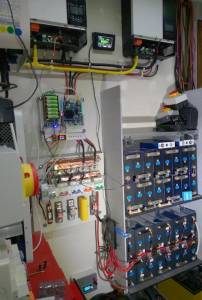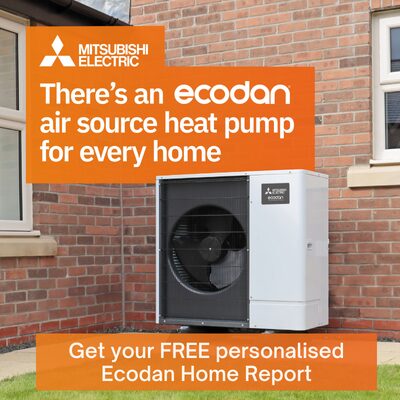@z8lccda one other set of question(s) for you to think about: large house or small house? draughty old thing or passivhaus? number of people in the house? baths or showers ? teenagers with long hair? those all factor into how much heat you need for space heating vs hot water heating. In a super-insulated house with a large family the dhw heating may be more than the space heating. in a larger less insulated house with 1 person it'll be the other way round.
My octopus signup link https://share.octopus.energy/ebony-deer-230
210m2 house, Samsung 16kw Gen6 ASHP Self installed: Single circulation loop , PWM modulating pump.
My public ASHP stats: https://heatpumpmonitor.org/system/view?id=45
11.9kWp of PV
41kWh of Battery storage (3x Powerwall 2)
2x BEVs
I too have another question @z8lccda 🙂
I assume that your present PV panels are connected to the grid via an inverter with a G53 certificate (an approx equivalent to G98).
So that probably means you are enjoying FIT income at a relatively high rate.
If you replace/upgrade to newer hardware, then you lose those payments.
Equally, if the effective use of the roof is of greater value to you, then the FIT payments matter less.
Others are caught in this dilemma. The FIT income was wonderful until the energy crisis hit them.
That 'devalued' the FIT, and has made them reappraise the need to make their house more energy efficient.
Payment for electricity exports are now made under the Smart Export Guarantee (SEG), which can be as low as 4p/kWh 😥
At that level it isn't 'financially viable' to install PV panels because there will never be a point in time when you recoup the outlay.
I'm unsure if you've already understood this because you haven't (yet) mentioned having storage batteries.
That technology has gained financial viability during the rising prices of the recent energy crisis.
The capital cost of PV panels and batteries are pretty low. But the costs of hiring an MCS-accredited installer have been rising.
However, if you decide not to export electricity, but only use or store it, then there's no requirement to get an MCS certificate anyway.
You'd only require it to obtain government-back grant assistance, FIT-payments and SEG.
Generic tradesmen (like electricians) are cheaper than those with MCS accreditation.
Installation costs can be lowered further by taking a DIY approach (guided by us here!).
Nor are you restricted to select the hardware from the MCS list of approved products.
There are no right/wrong answers here.
It comes down to your preferences and what you'd like to achieve.
Save energy... recycle electrons!
thanks for your thoughts gentlemen, much appreciated
to clarify, i already have a solar thermal with a 210 litre tank; this was installed 10-12 year ago (we've been in the house 6 years)
one of the weaknesses of the solar thermal system, and maybe more modern ones are better, is that you can't program the solar generation to activate based on the weather (aka the solar array temperature)
Instead, you program the hot water to work at set times/days. Just like with a conventional boiler. The drawback of this for me is that if the solar array is not hot enough, you are consuming gas. And gas will be used continuously to reach the desired water temp, if the sun does not come out in that period.
The preferable method would be an option to activate solar thermal heating only when there is sufficient solar gain. Independent to the firing of the boiler. IE a programme that checks throughout the day if there is solar gain available, and exploits that when there is. And does not attempt to use gas as part of that programme.
I could probably change the current programmes through the course of the year to be more in favour of when there is *likely* to be solar gain (e.g. 9am-6pm, April-Oct), but i'd still consume a load of gas keeping the tank up to temperature, when it's cloudy / raining.
In addition, when i look at the solar thermal installation, I've got this ruddy great tank in the garage, with controllers, expansion tank, regulators, valves and an array of pipework that.. all a bit 'heath robinson' i'd rather just be rid of. Am sure i could get some money for it on eBay 🙂
Solar PV as we've mentioned, is a lot more versatile, esp. with a battery.
We'll be a two or 3 person household within a year or two, so our energy needs will change. Less DHW needed, heating will probably be about the same (and we tend to run our house fairly cool during the colder months anyway), electricity demand might increase slightly from lower occupancy offset by occasional EV car charging (no large commuting needs)
My thinking therefore, as this dilemma is prompted by major renovations we'll embark on later this year (e.g. full re-wiring) is to install a modest PV array and battery, with a combi.
If i want to feel good from using 'free' energy to heat my shower, i can fit one of the showers with an electric heated shower. Washing up - we tend to use the kettle anyway! Baths rarely used.
This way i can have a simple plumbing installation (no unvented tank, no solar thermal) and utilise electricity for general power needs as much as possible. I could expand the battery capacity in the future (if i think all is working well and we could make use of more).
Posted by: @z8lccdaone of the weaknesses of the solar thermal system, and maybe more modern ones are better, is that you can't program the solar generation to activate based on the weather
Quite. See my comment over here about the need for a "hold off" controller.
Posted by: @z8lccda[...] install a modest PV array and battery, with a combi.
If i want to feel good from using 'free' energy to heat my shower, i can fit one of the showers with an electric heated shower.
An electric shower is typically a 10kW device.
It's going to be a mighty impressive inverter to supply that from a storage battery. 🤔
I'm not saying it's impossible.
But it would warrant further discussion here before you start looking around for the required hardware!
Save energy... recycle electrons!
Posted by: @z8lccda[...] install a modest PV array and battery, with a combi.
If i want to feel good from using 'free' energy to heat my shower, i can fit one of the showers with an electric heated shower.An electric shower is typically a 10kW device.
It's going to be a mighty impressive inverter to supply that from a storage battery. 🤔
I'm not saying it's impossible.
But it would warrant further discussion here before you start looking around for the required hardware!
You make a very good point and i had not got that far in my research 😀
From my 2min google of 'electric heated shower' this morning i stumbled a product which states
"The powerful 9.5KW AQUAS AquaMax Flex Manual Smart Electric Shower.... you can even adjust the power to 5KW for an eco-friendly flow without compromising on your invigorating shower experience."
Either way it's a very helpful point you make - for even a 5kw shower i'd need something like a Givenergy Hybrid Inverter 5.0 / Giv-Battery 5.2?
Products - GivEnergy
On reflection i don't necessarily want to oversize a modest system, just for a short shower or two daily 🙂
Slightly off topic, but i think ovens / induction hobs work around 1-2kWh? So if the system can handle an electric shower, then would be ok for these too?
thanks
Posted by: @z8lccdayou can even adjust the power to 5KW for an eco-friendly flow
Wonderful... but I'm pretty sure it will still obey the laws of physics.
At 5kW you'll be showering in tepid water, however 'invigorating" is the water velocity !
I was once asked to fit an 8kW electric shower for someone... "so I won't have to pay an electrician to change the cable".
The result was inevitable.
A month later an electrician was summoned to install a 10mm² cable-run from the fuse-box. 🤨
Excluding a heat-pump, the household devices which use most electricity are:
- electric shower
- built-in oven
- kettle
- microwave
- hob
The drain on other power-sockets is tiny in comparison, and lighting is now mainly LED anyway.
If you're considering storage battery and inverters capable of giving you 10kW, then you're most of the way towards running the whole house off-grid.
That's exactly what I'm working towards.
I'll soon have three battery banks totaling 42kWh, and 3 or 4 hybrid inverters delivering 15-20kWh.
Whatever shortfall I get from the solar-panels can be drawn from the grid using a Time-of-Use (ToU) tariff.
That's currently 12p/kWh, and will eventually be less.
But... keeping the topic title in mind... I will still retain the solar-thermal panel.
Save energy... recycle electrons!
@transparent thanks very much for your input here. Very helpful.
Oh and "I'll soon have three battery banks totaling 42kWh..." WOAH !
Nice 👍
Re: the following quote by Johnno: "There is no issue doing that, I have a similar setup. To get best efficiency you need to divert water past the combi when it's hot enough to go direct to the tap. You can get solar water diverters and mixers. The idea is, when the water coming out of the cylinder is above 43 deg the water is directed to the tap via a mixing valve. If it is hotter than say 55 degs it is mixed with cold water. When the output is below 43 the water is directed to the combi. If you don't have the mixer and diverter, the boiler is stop starting every time someone opens the tap. And you save very little."
I live off-grid and want to connect a direct lpg water heater to a solar thermal fed hot water cylinder. I have been told that I need a 'modulating boiler' but I can't find one.
What is described above seems to be what I need, except that I don't need a combi-boiler (no space heating). Can you please tell me what product you used to modulate the gas firing (i.e. to switch on the gas only when the water in the cylinder needed it)?
Thanks,
Andrew
Can you explain a bit more about the context in which you were told about the need for a 'modulating boiler'?
All boilers in UK must have at least one thermal device which 'calls for heat' and then switches the boiler off again when the demand has been satisfied.
But I haven't heard of that feature being referred to as 'modulating'.
The term 'modulating' is normally applied to a pump, rather than the boiler itself.
A modulating pump changes the speed of the impeller according to the pressure drop at its outlet.
The more valves that are open in the home, the lower the outlet pressure.
The pump responds by increasing speed to match that demand.
Finally, can you please confirm that the DWH cylinder you are referring to has (at least) two coils?
How is it currently plumbed in?
Save energy... recycle electrons!
Certainly. Thank you for responding.
My circumstances are that I am building a 20ft x 10ft washroom. It will not have mains electricity, nor mains gas, but will have solar PV and battery at 12v with 230vAC via inverter. It will have mains pressure water. I can easily get bottled LPG. I only need hot water for washing (no space heating).
I would like to heat the water as much as possible with solar. Certainly there will be surplus in summer to feed an immersion heater from the battery, but the obvious choice was solar thermal. I am aware that I will need a fossil-fuel booster during winter and so I thought LPG would be best.
The term 'modulating boiler' was given me by a solar thermal manufacturer and installer. What the man recommended was solar thermal feeding a HW cyclinder backed up by (his term) a 'modulating boiler'. Such a boiler, he said, would know when the water in the cylinder was too cold and would divert to LPG accordingly at these times, thus limiting the use of LPG. He said that he could supply the evacuated tubes and the cylinder but that I'd need to source the modulating boiler. He said that they use such systems for people working off-site, for example.
I don't have a HW cylinder yet, so I don't know if it has two coils. There will certainly be the coil from the solar thermal, but what would be the other?
I found this forum while searching for the 'modulating boiler'. 'Johnno' seems to have the system that I need. Hence my post
I phoned Alpha, who were useless. I phoned Worcester-Bosch who said that they had such a 'modulating boiler', called an R1, but their concern was that it might only work with mains 230vac since, I quote: "it needs to reference to earth, and the boiler may not rectify". He asked me to look into this.
Any advice would be appreciated please. Or any recommendations for alternatives. I thought about the small systems that are for caravans (Truma), but I don't think I could have solar thermal.
Andrew
There's a lot here for us to chew over @anr
and I'm going to ask @editor if he knows of a boiler specialist who can also provide an opinion.
I'll have a look at the R1 boiler you refer to..... but it's a busy day,
and I'm in the middle of writing a submission for a planning application by a developer who doesn't understand Low Carbon Technology (LCT). 😥
My first observations concern the battery and immersion heater.
Unless you require a particularly powerful immersion heater, you should consider using one which operates at Ultra-low Voltage (ULV) which means below 75v within UK regulations.
I have successfully used a nominal 24v 1.1kW heater as a dump-load from a wind turbine.
How much hot water do you expect to need?
Go to TP Fay to see what ULV immersion heaters they make.
I'm then unsure why you've arrived at a battery operating at only 12v.
Apart from an immersion heater, what else are you wanting to power from the battery/inverter?
The lower the battery voltage, the thicker must be the connecting cables for a given power input/output.
Copper cable is expensive stuff.
Save energy... recycle electrons!
Thank you @transparent
I'll answer the electrics first:
Thank you for recommending the ULV immersion heater. But mustn't they therefore draw larger current which means thicker cable, and ultimately also the same power consumption? Anyway, I'll have a look.
I am actually comfortable with the electrics. I've lived off the electric grid for four years. I live on the north coast of Scotland, so in summer I have nearly twenty hours of sun, and the washroom will use little other electricity than an extractor fan plus lighting. I have big Varta Pb-acid batteries and I'll probably just use one of these at 12v.
I find the 12v lights and extractor fans are great for my climate. They use little power, plus I don't need to have an inverter switched on and thereby avoid its constant baseload which (although small) is not trivial and which in winter can take the battery voltage down quite low when there are consecutive days without sun. So I keep the inverter switched off unless I need it which is rare.
I am aware of the cabling costs for 12v, but the battery will be adjacent to the washroom. The washroom will be in a field, across a road from my existing battery, so I need a separate battery supply. But, as said, it is adjacent to mains pressure water.
One concern I have is whether the boiler will need a constant 230vac supply, which defeats the object of keeping the inverter off. Perhaps those camper Truma systems use 12vdc. If it comes to it, I will have to have the inverter switched on constantly.
The size of cylinder: the solar thermal man recommended 90L. I wouldn't want any larger than that.
I think that is everything. @johnmo seems to have the components.
Thanks
- 27 Forums
- 2,520 Topics
- 58.6 K Posts
- 649 Online
- 6,800 Members
Join Us!
Worth Watching
Latest Posts
-

RE: Heat Pump vs New Gas Boiler for Inherited House - Worth the Extra Cost?
@fretless6, where are you based? I might be able to con...
By Mars , 24 minutes ago
-

RE: Underfloor Heating Installation Issues with Heat Pump
I'm going to install Thermacome ACOSI+ radiant ceiling....
By bobflux , 1 hour ago
-
Issue with a Grant Air Source Heat Pump & Tado Smart Thermostat
Hi all I'm having some trouble with a Grant ASHP and ...
By Renewables345 , 2 hours ago
-
RE: Testing new controls/monitoring for Midea Clone ASHP
Now seems a good time to summarise the costs and effici...
By benson , 2 hours ago
-

RE: Tell us about your Solar (PV) setup
@mk4 Charge to 100%, discharge down to 10%.
By bobflux , 4 hours ago
-

RE: Daikin Altherma 3 LT compressor longevity question
This mess is intriguing: I wonder if this represent...
By bobflux , 5 hours ago
-
RE: Connecting Growatt SPH5000 over wired ethernet rather than wireless
The simplest wired option is usually the Growatt Ethern...
By Jonatan , 9 hours ago
-

RE: Peak Energy Products V therm 16kW unit heat pump not reaching flow temperature
ASHPs do have a minimum compressor speed. The minimum h...
By bobflux , 16 hours ago
-

RE: Electricity price predictions
@jamespa And it seems some of the nasty public cloud...
By Batpred , 16 hours ago
-

RE: Jokes and fun posts about heat pumps and renewables
Technology is rapidly advancing. BBC News reported th...
By Transparent , 20 hours ago
-

What matters for flow and pressure drop is internal dia...
By bobflux , 20 hours ago
-

RE: Do Fridges and Freezers have COP ratings?
@editor Thank you all for your replies and submitted in...
By Toodles , 23 hours ago
-

I know and yes. The secondary deltaT wont necessaril...
By JamesPa , 1 day ago
-

RE: Designing heating system with air to water heat pump in France, near Lyon
Just love the way you put it! 🤣
By Batpred , 2 days ago
-

RE: Safety update; RCBOs supplying inverters or storage batteries
Thank you for sharing. So it seems that your Schneid...
By Batpred , 2 days ago
-

RE: Forum updates, announcements & issues
@upnorthandpersonal thanks for the thoughtful, consider...
By Mars , 2 days ago
-

RE: Solar Power Output – Let’s Compare Generation Figures
@mk4 All 21 panels have their own Enphase IQ7a microinv...
By Toodles , 2 days ago
-
RE: Setback savings - fact or fiction?
Great, so you have proven that MELCloud is consistently...
By RobS , 3 days ago
-
RE: Mitsu PUHZ120Y 'Outdoor Temp 'error?
Thanks David & James It almos...
By DavidAlgarve , 3 days ago
-

RE: Surge protection devices SPDs
@trebor12345 - your original Topic about the right type...
By Transparent , 3 days ago
-

RE: Help needed with Samsung AE120RXYDEG
@tomf I’ve been sent this from a service engineer at Sa...
By Mars , 3 days ago
-

RE: Buying large amp bidirectional RCD and RCBO
Yes... I went through this particular headache and ende...
By bobflux , 4 days ago
-

O-oh! Let's take this as an opportunity to 'pass the ...
By Transparent , 4 days ago




